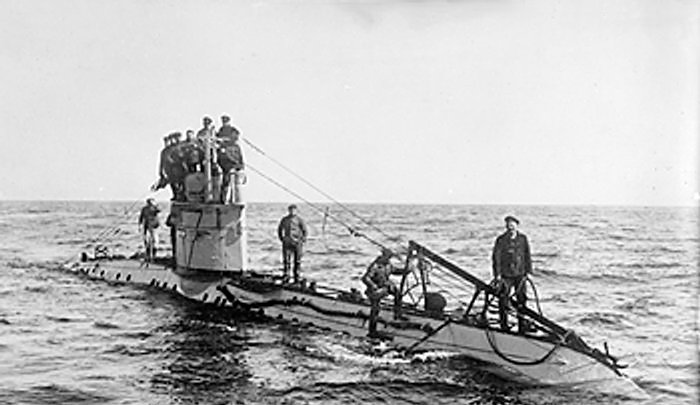Imagine the surprise when the mother of 17-year-old James Ritchie received a postcard from him months after he and fellow fishermen disappeared saying they were German prisoners of war.
They were assumed as having been lost at sea, the debris of their fishing boat The Bella, found floating in a tiny bay on the Aberdeen coast not far from home. He wrote they were alive and treated well. A tin of syrup, soap, a towel, and some money could be sent, in addition to small roasted fish.
Last weekend was exactly 100 years since the crew was captured by a German U-Boat which reconnoitered the North East coast about six miles from the quiet shoreline.
On September 25, 1916, James Ritchie put out to sea with his father, skipper James – nicknamed Auld Briney – in addition to John Cargill (Auld Johnny). They were accompanied by shipmates William Ritchie and James Freeman Ritchie, who was also 17.
The crew motored slightly north of Catterline Bay to shoot long lines for ling and haddock, approximately six miles from the coast. However, as related by local historian and songwriter Dave Ramsay – the leader who lobbied for a commemoration for the crew’s families – the hunters became the hunted when the distinctive outline of a German submarine surfaced from the North Sea. From the deck of The Bella, Auld Briney, and his crew, a trio of teenagers, looked on with trepidation.
Because they were fishermen, each had reserved job status during WWI and didn’t have to serve in the armed forces. Very soon, the half-dozen men were in the midst of the war. By one account, the U-Boat Oberleutenant was apologetic as he drew alongside the Bella to tell them that since they had seen the submarine – they must be taken prisoner. After being taken aboard, it is assumed in some quarters that the Bella was destroyed using explosive charges.
Search crews sent out to find the crew, but found wreckage instead. According to reports, the submarine stayed in the area with the Bella crew given one last glimpse of Gourdon through a periscope. The men disembarked at Wilhelm’s haven and were moved to PoW camps. Younger crew members were put to work in forests as woodcutters with reports proposing the older men were treated similarly to officers.
Relatives of the crew members met in Gourdon for a commemoration ceremony with around 100 people scheduled to attend – many of them Cargills and Ritchies. Among them was Alan Ritchie, the great-nephew of James ‘Auld Briney’. He said James returned to fishing immediately after being freed in Germany in 1918 and bought a new boat entitled the Happy Return, The Scotsman reported.
Mr. Ritchie presented a model of the boat, which he said had been hanging in his shed coated with coal dust for a considerable number of many years, to the Maggie Law Museum in Gourdon. “It’s wonderful that this story is now being remembered. It happened a century ago, so it is the time everyone knows about it,” said Mr. Ritchie.
Mr. Ramsay, project director of Mearns Heritage Service’s project, performed a specially composed song at the commemoration event, also attended by a number of Aberdeenshire dignitaries and the German consul general.
He said that after the men had disappeared, there was this large emotional vacuum for the families between the wreckage of the Bella being located and the word that the men were held in Germany. He knew nothing of the Bella story until he read two lines about it in a book written by local historian Roy Souter. He realized right away that this was a story worth recounting.
